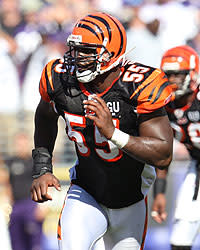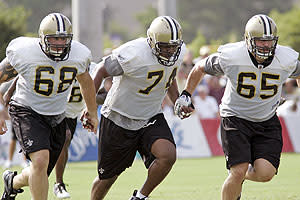Protection coming for defensive players
DANA POINT, Calif. – A few months ago, when then-Baltimore Ravens linebacker Bart Scott was recounting all of the fines that had been levied against defensive players in the 2008 season, he turned his ire to the NFL at large.

Rivers missed the final nine games of his rookie season.
(Ned Dishman/Getty)
"Look at the rules," said Scott, now a member of the New York Jets. "It's garbage. You can't touch this offensive player after five yards [beyond the line of scrimmage]. You can't hit any of them in the head. You can't hit this one below the knee. You can't hit this one if he's supposedly defenseless. You can't hit them away from the ball. Everything is designed to protect [the] offense. The [NFL] could care less about defensive players. Was anyone out there saying 'Oh boy, we need to protect [Cincinnati Bengals linebacker Keith Rivers] when he got his jaw broke and never saw [the hit] coming?' No. People were all like 'Oh, that's tough play.' Maybe if you are going to protect supposedly defenseless offensive guys, you should protect defenseless defensive players, too."
Now, in the wake of several crushing "blind" helmet-to-helmet hits by offensive players, the NFL is aiming to do just that. When the league's annual meetings wrap up later this week, the competition committee hopes to have a new rule passed that will protect defensive players from devastating peel-back blows. Blows like the one that leveled Rivers, when he had his season ended by Pittsburgh Steelers wideout Hines Ward in Week 7 of last season.
During that particular play, Ward peeled back after a reception by Steelers tight end Matt Spaeth, and launched himself into Rivers, who was in pursuit. Because of the angle, Rivers never saw Ward, and the resulting collision broke Rivers' jaw. League representatives cringe at the suggestion this is the "Hines Ward Rule", pointing out repeatedly that Ward's hit was perfectly legal under the old system.
"There were a lot of blocks that came into this one," said Rich McKay, co-chairman of the competition committee and president of the Atlanta Falcons. "We saw special teams hits where people were coming back towards the goal line and hit too high. We saw many blocks of receivers, and I saw the Hines Ward hit, all of which were legal blocks. I don't think we focused on Hines' block at all as the reason to change the rule. I think we focused on the fact that we didn't like, in certain situations, the fact that players had no real opportunity to defend themselves and were getting hit helmet to helmet. We felt that was a risk that they had not assumed and shouldn't assume, and we should try to take it out."
"I think there was some debate [on the Ward hit]," said Ray Anderson, the NFL's vice president of football operations. "Some of our guys may have seen helmet-to-helmet, some may have seen shoulder-to-helmet. … Certainly, Hines was one, perfectly legal last year, but as Rich [McKay] said, the result of those types of hits, and there were several of them that we looked at, led to the conclusion that for player-safety sake we have to eliminate those types of blind-side hits if you will, for the betterment of our players and our game going forward."
In meetings that will be dominated by talk of economics and collective bargaining, the banning of "blind" hits will be one of several pieces of minor legislation that aims to clean up loopholes in player safety. Among the changes, the wedge could be banned from play.
The wedge is typically a four-man wall created on kick return units, aimed at protecting the returner and busting open a vertical seam for him to run through. It's typically one of the more brutal tactics used on special teams, and has become more violent as some teams have employed "wedge busters" – players whose sole purpose was to crash into and break up the wall. When the competition committee sought out safety feedback from players, the wedge was one of their primary concerns.
"One of the things that is impressive," Anderson said, "is that the players are very engaged in protecting themselves, and so with regard to the wedge in particular, they were the primary instigators of those discussions."
But the wedge and helmet-to-helmet hits by offensive players won't be the only changes pushed for player safety. Among the other tweaks that could be made this week, the committee wants to put increased emphasis on the horse-collar tackle, as well as low hits on quarterback. The NFL will also move to strike the "bunch" formation from onside kicks, in which players group together to become more difficult to block during the play. The competition committee also wants to expand the "defenseless receiver" rule, which makes it illegal for defenders to strike a wideout when he is suspended in the air in pursuit of the football, and defenseless against oncoming hits. The league is hoping to expand that rule to keep defenders from delivering forearm or shoulder strikes until a receiver has gotten possession of the football with both feet on the ground.

Saints players working on the wedge technique in training camp.
(Rogelio V. Solis/AP Photo)
Here are some of the major issues that won't see significant movement at this week's meetings …
• Expanding the regular season: While it will be a topic of discussion, the issue is still in an embryonic stage. The league still needs to analyze the logistical impact of a 17-game regular season versus 18 games. The process will also eventually include feedback from players, as well as pending collective bargaining issues, as any change will have to be reflected in the new CBA.
• Overtime: There will be no changes in the way overtime is currently run in the NFL, despite statistics showing that 43-percent of the time, the team winning the coin toss in the extra session typically wins on the first drive. McKay said feedback from players, coaches and executives was overwhelmingly in favor of keeping the current system.
• Hair: Regulating a player's hair length has been dropped as a topic and isn't likely to be revived.
• Expanding the playoffs: Like hair, it has also been dropped and isn't expected to be a topic again anytime soon unless there is a groundswell of interest put forth by teams. That doesn't appear likely in the near future.
• Tampering: While the issue of free-agent tampering will likely be discussed – as well as the potential for creating a seven-day "negotiating" period for agents and teams prior to visits beginning – no substantial moves are expected. Any legislation or changes in the current system could be years away.
